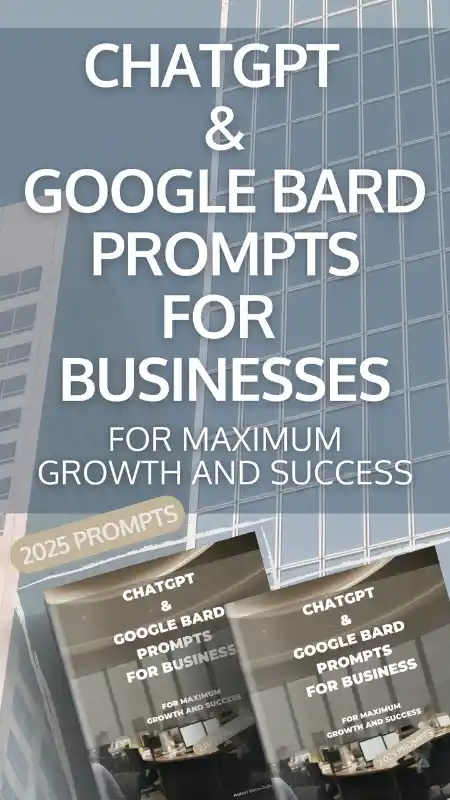

Increase your business success with ChatGPT and Google Bard!

Table of contents
• PREFACE
• ADDITIONAL NOTE
• 100 CAPITAL BUDGETING PROMPT TEMPLATES
• 115 TAX PLANNING PROMPT TEMPLATES
• 120 BUDGETING AND SAVING PROMPT TEMPLATES
• HUMAN AND RESOURCE
• 50 EMPLOYER BRANDING PROMPT TEMPLATES
• 50 EMPOWERING MANAGEMENT PROMPT TEMPLATES
• 50 HYBRID WORK PROMPT TEMPLATES
• 50 INTERNATIONAL HIRING PROMPT TEMPLATES
• 50 PERFORMANCE MANAGEMENT PROMPT TEMPLATES
• 50 PROFESSIONAL DEVELOPMENT FOR EMPLOYEES PROMPT TEMPLATES
• LEADERSHIP
• 90 LEADERSHIP GENERAL PROMPT TEMPLATES
• 100 BUILDING TRUST AND RESPECT PROMPT TEMPLATES
• 100 PROJECT PLANNING AND DELEGATING PROMPT TEMPLATES
• 110 STRATEGIC THINKING PROMPT TEMPLATES
• PERSONAL DEVELOPMENT
• 100 GOAL SETTING PROMPT TEMPLATES
• 100 HAPPINESS PROMPT TEMPLATES
• 100 LIFELONG LEARNING PROMPT TEMPLATES
• 100 MINDFULNESS PROMPT TEMPLATES
• PRODUCTIVITY
• 100 HEALTH AND WELL-BEING FOR PRODUCTIVITY PROMPT TEMPLATES
• 100 PRODUCTIVITY PROMPT TEMPLATES
• 100 PRODUCTIVITY PROMPT TEMPLATES
• 100 TIME MANAGEMENT PROMPT TEMPLATES
• SMALL BUSINESS 100
• 100 BUSINESS ADMINISTRATION PROMPT TEMPLATES
• 100 GENERAL SMALL BUSINESS PROMPT TEMPLATES


Support for ChatGPT Google Bard
In this book, each prompt, aligned with AI, has been carefully designed to provide practical and applicable solutions to the complex challenges of modern business. Whether you are a seasoned entrepreneur or an emerging leader, this book is an indispensable tool for your success. Make the most of AI and exploit its full potential.
Extract from Capital Budgeting Prompt Templates
1. Key principles to consider when undertaking capital budgeting for your [] project.
2. How to effectively incorporate time value of money concepts in [] capital budgeting decisions.
3. Strategies for evaluating the risk and return of long-term projects using capital budgeting in a [] scenario.
4. Tips for utilizing the net present value (NPV) method for optimal [] capital expenditure decisions.
5. Role of internal rate of return (IRR) in guiding capital budgeting decisions for your [] venture.
6. Techniques to incorporate non-financial factors in the capital budgeting process of your [] project.
7. How to address potential uncertainties and contingencies in capital budgeting for a [] business expansion.
8. Strategies for prioritizing multiple projects when capital resources are limited in your [] organization.
9. Tips for understanding the payback period method and its relevance in your [] capital budgeting scenario.
10. Role of sensitivity analysis in assessing the viability of projects under various [] capital budgeting assumptions.
11. Techniques to integrate external factors, like macroeconomic shifts, into your capital budgeting for [] industry developments.
12. How to account for tax implications and incentives when devising a [] capital budget plan.
13. Strategies for considering opportunity costs and alternative investments in your [] capital budgeting decisions.
14. Tips for utilizing the profitability index to weigh the benefits and costs of a [] capital project.
15. Role of scenario planning in forecasting potential outcomes and risks in [] capital budgeting.
16. Techniques for continuous monitoring and adjusting of capital budgets in response to your [] project’s real-time performance.
17. How to effectively engage stakeholders in the capital budgeting decision-making process for your [] initiative.
18. Strategies for incorporating sustainability and environmental considerations in capital budgeting for [] green projects.
19. Tips for managing the potential conflicts between short-term financial goals and long-term capital budgeting in your [] organization.
20. Role of advanced financial modeling and simulations in enhancing the precision of [] capital budgeting.
